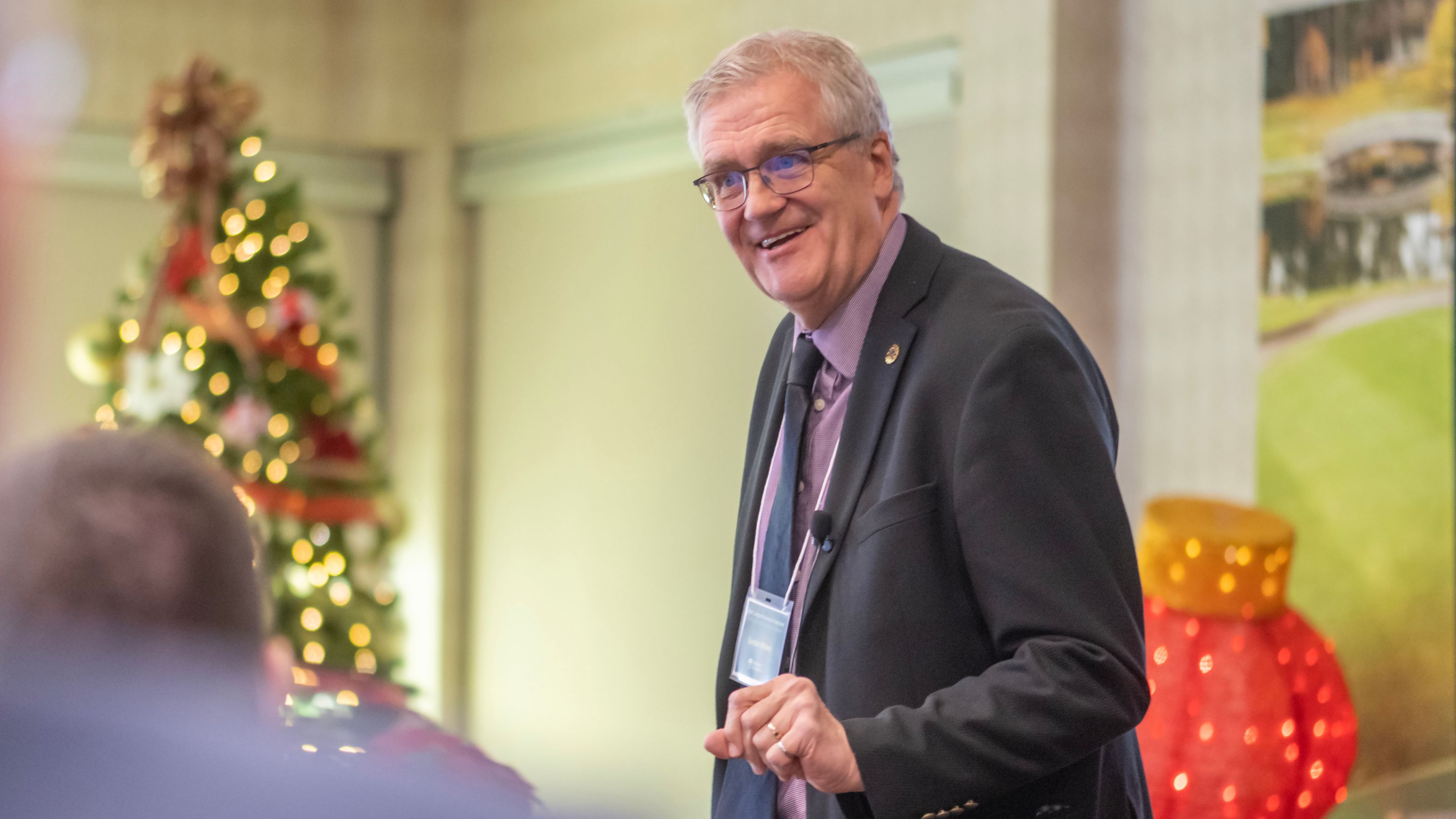Launched in December 2022, in response to an increase of reportable, preventable and serious near-miss incidents in 2021-22, A Culture of Care is the University of Alberta’s three-year safety action plan. Gordon Winkel, a chair and industrial professor in the David and Joan Lynch School of Engineering Safety and Risk Management, is a great supporter of the plan. Following years of experience as a vice-president for Syncrude Canada Ltd., he has an informed understanding of what it will take to bring the plan to fruition.
“How we do work [at the University of Alberta] needs to continually grow in its capacity to reliably deliver work and activities safely. It means we're protecting people and assets, we’re protecting the environment and we’re protecting our ability to operate sustainably in our society.”
Winkel — also a member of the Board of Governors’ Board Audit and Risk Committee — gave the keynote speech at the Health, Safety and Environment Symposium where A Culture of Care was launched, sharing the expertise he gained in developing and supporting a safety culture for Syncrude and in industry sectors at large.
He emphasizes the importance of making safety a core institutional value.
“In contrast to safety as a priority or objective, safety has to be promoted to become an enduring value or guiding principle that defines the DNA of the institution as it works to deliver on its vision. It means that if we can’t do it safely, we won’t do it at all.”
Winkel points out that the president of the university has signed a commitment to safety. Having these commitments is important because part of making safety a core value is about setting the “tone at the top.”
In his keynote speech, Winkel shared a slide showing that when safety was adopted as a core value at Syncrude, the number of serious employee injuries significantly decreased, falling well below the provincial average for all industries.
“For safety to be considered a core value, we have to shift from compliance, which is something we have to do, to commitment, which is something that we want to do.”
Once safety has been accepted as a core value, workplaces can advance a safety culture, where everyone is empowered to play a role in workplace safety.
“We need a culture where people have the capacity, the passion and the resources to basically go forward and make safety real.”
Winkel explains that the shift to a culture of safety means that each employee feels that practicing safety is part of their work and that it is fully integrated into everything they do.
In his keynote speech, Winkel explained that the benefits of establishing a safety culture are not only a reduction in injuries, but the prevention of damage to university property, the prevention of damage to the university’s reputation, the prevention of negative impacts to teaching or research, the prevention of lost research funding, the prevention of loss in productivity, and the prevention of financial penalties or criminal charges.
Most crucially, it means that everyone gets to go home at the end of the day.
To that end, Winkel has some advice on how university staff and faculty can contribute to safety. First and foremost, all good safety begins with knowing the potential hazards in your worksite and ensuring proper controls and standard operating procedures are in place to mitigate them. It means:
- Wearing appropriate personal protective equipment for each task, whether you’re in a lab, doing field research, or maintaining our facilities;
- Knowing emergency procedures and who to call in the event of an emergency situation or incident;
- Participating in drills and ensuring your emergency response readiness is where it needs to be;
- Taking a first aid course and familiarizing yourself with the location of first aid kits and AEDs in your workplace;
- Doing simple things in everyday activities like using three point contact when going up and down the stairs or a ladder, and not being distracted by personal devices when driving or even walking.
By taking these actions, we demonstrate care for our own safety and the safety of others.
All of these tips address physical safety on campus, while other initiatives of A Culture of Care address psychological and cultural safety.
In addressing psychological safety, Winkel says it’s key to remember that safety is ultimately about protecting people.
“From a psychological point of view, are there stresses that we introduce in our environment that could lead to dysfunction or despair, or perhaps bring on illness over time? It’s another dimension of safety we all need to learn and think about.”
Winkel says that just as we each play a role in keeping each other physically safe on campus, we each play a role in keeping each other psychologically safe as well.
“We want to be committed to each other’s well-being. We want to make sure that we really reach out to people and we make an effort to understand and meaningfully include them, where people can feel good about their university experience.”
The University of Alberta is committed to the safety, health and well-being of our faculty, staff and students. Every day, we advance this commitment to safety through the Culture of Care.

